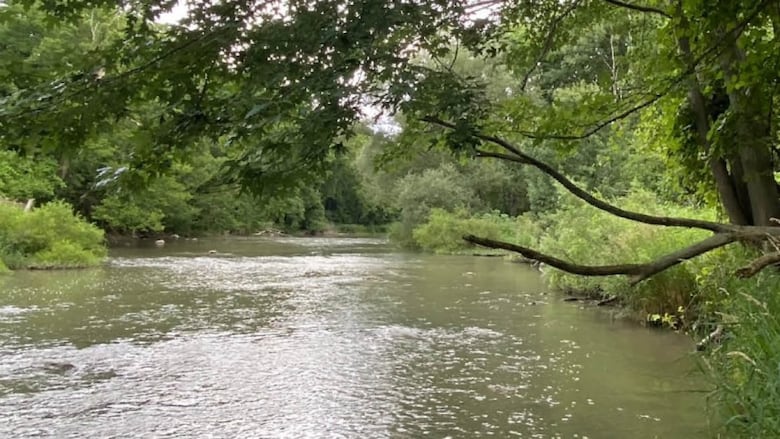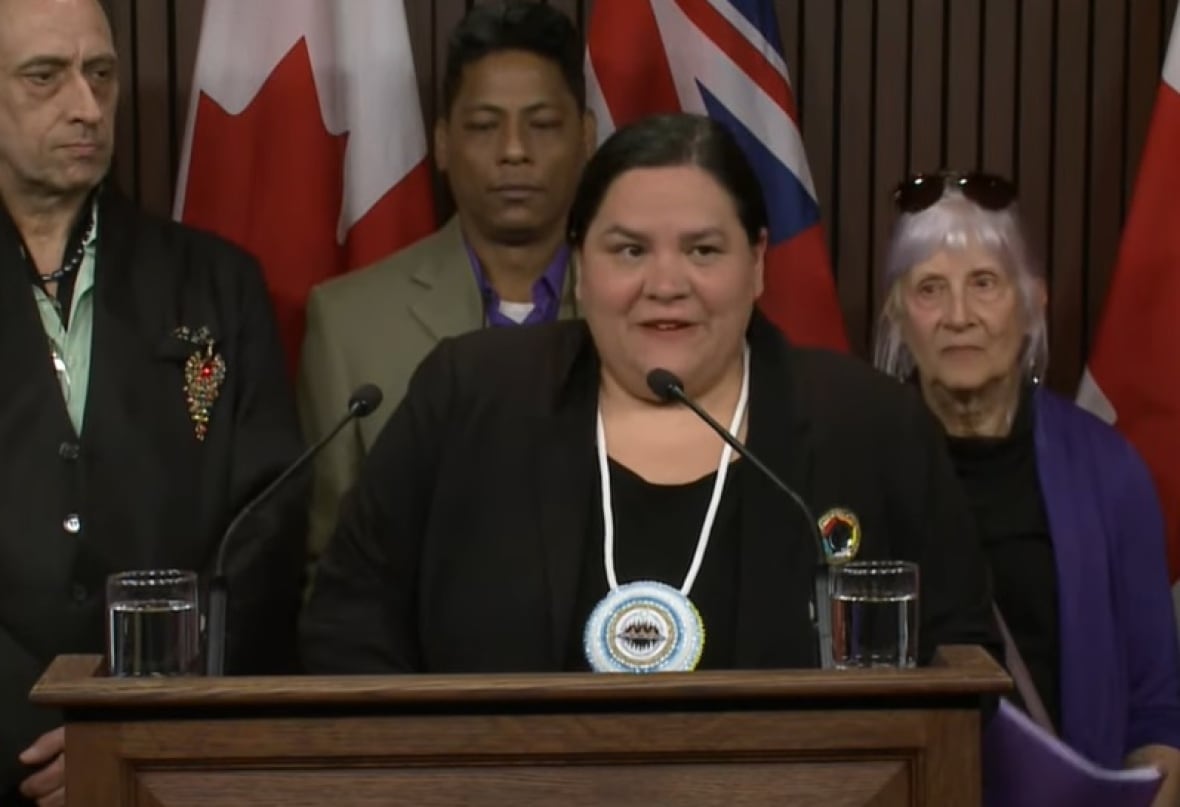Walpole Island First Nation holds protest against Dresden landfill expansion
Ontario actions violate the First Nation's rights, chief says

Fire keepers from Walpole Island First Nation watched over a sacred fire near the bank of the Sydenham River over the weekend as part of a series of events in response to a planned landfill expansion in Dresden — and Ontario legislation that appear designed to expedite it.
Knowledge keepers from the community stood on the shore and sang a water song in Anishinaabemowin as more than a dozen canoes and kayaks glided down the river from Dresden to Wallaceburg, praying as they paddled.
"The legal protections. They were there for a reason. I'm confused on why we're going backwards and why we're not protecting our homes like we used to," said Chloe White-Deleary, one of the paddlers.
"It counts on humans, all of us, to be stewards of the land. And in my culture, we think about not just us, but like what are we doing to protect the next seven generations?"
Waste management company York1, is proposing to expand the landfill site, located just over a kilometre from the edge of Dresden, to cover 25 hectares and receive 6,000 tonnes of construction and demolition waste each day.
A spokesperson told CBC in a statement in early June that it plans to use the site to turn clean wood into mulch, compost, and raw materials for particleboard and paper manufacturing; to turn mixed wood waste into alternative low-carbon fuels; and to prepare rock and rubble for use in cement and concrete production, aggregate replacement in construction, base for sports fields or running tracks and decorative use in landscaping.

But the proposal has faced significant community opposition from local residents and environmental groups concerned about the impact on nearby bodies of water.
And that opposition has grown since the Ford government introduced Bill 5, which became law on June 5 and which exempts "specified activities relating to the Chatham-Kent waste disposal site" from Part II.3 of the Environmental Assessment Act, which requires applications for projects under the section to be accompanied by environmental assessments.
Walpole Island First Nation Chief Leela Thomas told CBC Windsor Morning Tuesday she thinks the government's actions violate Section 35 of the Canadian Constitution, which includes a duty to consult First Nations before making decisions that could impact their rights.

It also violates the Treaty of Niagara and the United Nations Declaration on the Rights of Indigenous Peoples, she said, which requires governments to seek free, prior and informed consent for developments on their lands.
"Our family members use those waterways for hiking, fishing, harvesting and our ceremony," Thomas said.
"And we have those treaty rights to protect our rights to fish, to hunt and harvest and practice our culture on our own ancestral lands and waterways."
Nine First Nations are seeking an injunction to prevent government from using Bill 5 and federal Bill C-5 to fast-track infrastructure projects, arguing that both pieces of legislation authorize "the Crown to unilaterally ram through projects without meaningful or any engagement with First Nations" and "violate the constitutional obligation of the Crown to advance ... reconciliation."
In response to a request for comment about the legal challenge, the office of Ontario Premier Doug Ford said it had begun "productive conversations with First Nations who share our vision of unlocking economic opportunity and critical infrastructure in their community, and will continue these consultations throughout the summer."
"These consultations will shape the regulations and criteria for new special economic zones and Indigenous-led economic zones."
Thomas said she is honoured to have so many community members, especially young ones, who are vocal about the impact of Bill 5.
She is also grateful for generations of community members who have been dedicated to protecting the land and water and passing those teachings on to younger generations.
The goal of the fire was to create a peaceful gathering where decisions affecting future generations could be made collectively with full understanding of the consequences, said Amy White, a councillor with the First Nation.
White had a powerful experience at the fire when she saw three immature eagles circling overhead in a clockwise direction, she said.
"I shared that with the elder who I get [advice] from," White said.
"And what she had shared was that shows the connection between the next generation, and so how important … of a role they are going to play in this movement."
With files from Windsor Morning, Kate Rutherford and Erik White

